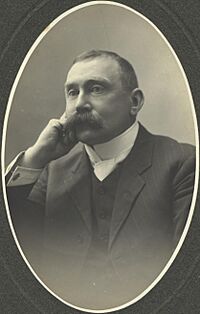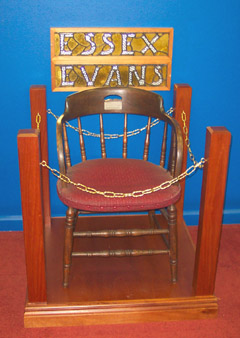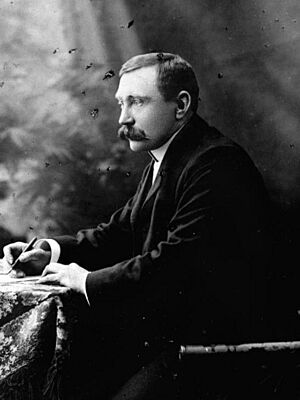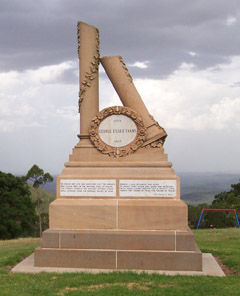George Essex Evans facts for kids
Quick facts for kids
George Essex Evans
|
|
|---|---|
 |
|
| Born | 18 June 1863 United Kingdom |
| Died | 10 November 1909 (aged 46) Toowoomba, Queensland, Australia |
| Pen name | G. Evans Essex; Anglo-Australian; Christophus; Coolabah; Drayton; and Kurrajong |
| Occupation | Poet, journalist, farmer, teacher, and public servant |
| Nationality | Australian |
| Education | Attended Haverfordwest Grammar School and James Collegiate School of Jersey |
| Genre | Poetry, short stories, journalism, literary criticism, and song lyrics |
| Spouse | Blanche Hopkins |
George Essex Evans (born June 18, 1863 – died November 10, 1909) was a famous Australian poet. He wrote many poems, stories, and newspaper articles. He is remembered for his patriotic poems and his bush ballads, which are poems about life in the Australian countryside.
Contents
About George Essex Evans
George Essex Evans was born in London, England, on June 18, 1863. His parents were from Wales. His father, John Evans, was a lawyer and a member of the British Parliament. Sadly, his father passed away in 1864 when George was just a baby.
George was raised by his mother, Mary Ann. She was a very smart woman who knew Latin and Greek. The family lived in a town called Haverfordwest in Wales. George went to school there and later in Jersey.
Early Life and Challenges
George Essex Evans had some challenges growing up. He was partly deaf, which meant he couldn't hear very well. Even though he was a great athlete, his teachers sometimes thought he was "dull" because of his hearing. His deafness also stopped him from joining the armed forces.
In 1881, when George was 17, he moved to Queensland, Australia, with his siblings. They traveled first class for 65 days around the Cape of Good Hope. His brothers planned to become farmers in a place called the Darling Downs.
However, George had a bad horse riding accident. He was thrown against a tree and couldn't do heavy farm work. Despite this, he was still very active. He played Rugby Union football for Queensland and enjoyed wrestling, running, and swimming.
Work and Family Life
As George got older, his hearing loss became worse. This might be why some people thought he was a quiet and private person. He first worked as a teacher at a private school. Later, he became an editor for a newspaper called The Queenslander, where he wrote about farming. He also wrote travel books for the government.
In 1888, he started working for the government. He became a District Registrar, which meant he recorded births, deaths, and marriages. He worked in Gympie and then later in Toowoomba.
In 1899, George Essex Evans married Blanche Hopkins. She was a young widow with two daughters, Lorna and Beryl. George and Blanche later had two sons of their own. Sadly, their younger son, Owen, died at five and a half years old from an illness.
The family built their home called "Glenbar" in Toowoomba. George's sister also lived with them.
Founding the Austral Society
In 1903, George Essex Evans started a group called the Austral Society in Toowoomba. This society aimed to encourage music, art, literature, science, and industry in Australia. He was very proud to be its founder.
People described George as a reserved person, sometimes moody. But he was also known as a kind and loyal friend. He had a strong sense of honor and respect, which made him a good husband and father. He also had an amazing memory, especially for poems. He knew a lot of English, American, and Australian poetry by heart.
George Essex Evans's Writings
George Essex Evans's poems and other writings were very popular during his lifetime and for some time after he passed away. Important critics and politicians, like Alfred Deakin (who later became Prime Minister), praised his work.
Published Works
His first book of poems, The Repentance of Magdalene Despar, came out in 1891. From 1892 to 1897, he worked with other famous Australian writers like Banjo Paterson on a magazine called The Antipodean.
In 1898, he published another collection of poems called Loraine and other Verses. In 1901, he won a prize for his poem "Ode for Commonwealth Day." This poem was praised by the Prime Minister at the time, Alfred Deakin.
His book The Secret Key and other Verses was published in 1906. George Essex Evans became well-known in Queensland for his patriotic poems, like "Cymru," and his bush ballads, such as "The Women of the West," which were very popular.
Government Work and Other Writings
The Queensland State Government also noticed his talent. After the success of his work The Garden of Queensland, George was asked to help advertise Queensland at a big exhibition in Paris, France, in 1908.
He also wrote and produced plays for the Brisbane Theatre, including a pantomime called Robinson Crusoe. In the last two years of his life, he wrote a lot about Queensland's resources for the government.
George Essex Evans wrote over 200 published poems. His work often appeared in Australian newspapers. He also wrote short stories, essays, humorous pieces, and a novella (a short novel).
His Passing and Memorial
George Essex Evans strongly supported building a new road across the Great Dividing Range in Australia. In 1909, he became ill. He was the first person to be transported over this new road when he was taken to the hospital. The workers on the road were so sad for the poet, who had worked hard for the road, that they carried him themselves.
George Essex Evans passed away on November 10, 1909, at 46 years old, due to problems after gallbladder surgery. The news of his death was announced during a large festival held by the Austral Society. The society decided the festival must continue to honor him, as he was most proud of being its founder. Many emotional tributes followed, recognizing his impact on Australian music, art, and literature.
His funeral was held on November 11, 1909. The Australian Prime Minister, Alfred Deakin, called him "Australia's Poet." Deakin sent a message to George's wife, saying he was "Deeply grieved at sudden and unexpected death of your greatly-gifted husband. Australia will mourn the loss of her national poet whose patriotic songs stirred her people profoundly in the arduous campaign for union."
A memorial statue of George Essex Evans was built in Webb Park, Toowoomba. On the statue are lines from his poems, including this part from his poem "Toowoomba":
Dark purple, chased with sudden gloom and glory,
Like waves in wild unrest.
Low-wooded billows and steep summits hoary,
Ridge, slope and mountain crest,
Cease at her feet with faces turned to greet her,
Enthroned, apart, serene,
Above her vassal hills whose voices greet her
The Mountain Queen.
For many years after his death, people in Toowoomba would gather at his monument in Webb Park on his birthday to remember him.
George Essex Evans's Legacy

A collection of all his poems, called Collected Verse, was published in 1928.
Since 1929, the Toowoomba Ladies Literary Society has made an annual trip to his memorial site. This society has also placed a plaque at the location of George Essex Evans's home to remember him.
You can find a collection of George Essex Evans's items and writings at the Toowoomba City Library. His papers are also kept at the Fryer Library at The University of Queensland.
Other reading
- George Essex Evans: Patriotic Poet of Australia - Volume 1 - His Life and Family. Bill Johnston. Maleny Qld. 2006.
 | Emma Amos |
 | Edward Mitchell Bannister |
 | Larry D. Alexander |
 | Ernie Barnes |



